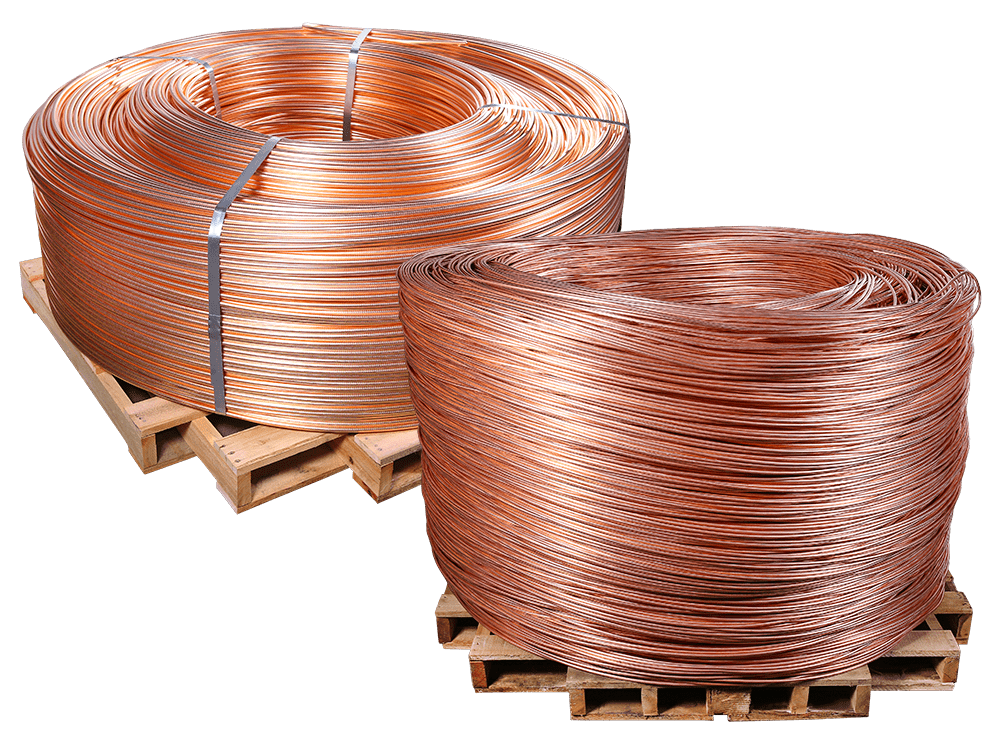Copper rod is a versatile product that can be used in different segments, as it manages to maintain its quality in adverse conditions, making it an essential component for industries. It is a product with excellent chemical resistance, corrosion resistance and easy handling.

The 8.00 mm copper rod is produced through the Up Cast OFHC (Oxygen Free High Conductivity) process, with a maximum oxygen content of 10 PPM. Indicated for the production of thin wires with a reduction of up to 0.05mm.
Copper Rebar 8.00mm RAF:
Refined copper rebar is a product that comes from the process of selecting copper scrap; its transformation plays an important role for society and the environment. Making it efficient in the copper cycle. Its product has as its focus the civil construction and energy sectors.
Applications: Low, medium and high voltage electrical conductors; electronics, automotive, telephony and telecommunications, civil construction, among others.

The 8.00 mm copper rod is produced through the Up Cast OFHC (Oxygen Free High Conductivity) process, with a maximum oxygen content of 10 PPM. Indicated for the production of thin wires with a reduction of up to 0.05mm.
Copper Rebar 8.00mm RAF:
Refined copper rebar is a product that comes from the process of selecting copper scrap; its transformation plays an important role for society and the environment. Making it efficient in the copper cycle. Its product has as its focus the civil construction and energy sectors.
Applications: Low, medium and high voltage electrical conductors; electronics, automotive, telephony and telecommunications, civil construction, among others.

In the automotive sector, copper is one of the main components used. Its high efficiency and ability to conduct electricity deserves a great highlight, so its use should increase within industries, making it essential to reduce energy consumption, improving system performance and thus reducing CO2 emissions during power production.
The use of copper has become fundamental for the future of mobility, having an advantage over other types of metals if used in vehicles, with great recycling capacity, because its material does not lose the level of efficiency in reuse.
The fact that copper is a resistant and versatile material is essential for the civil construction sector, due to its properties and mechanical characteristics in any residential and urban infrastructure, being present from pipes, connections, installations, to refrigerators and electronic devices.
In addition to ensuring mechanical resistance to corrosion, it is also a material that has excellent electrical conductivity and stands out for its performance and durability, used in different areas of civil construction.
The higher the copper content of the network cable wire, the better the conductivity and long-distance transmission capability, making it an essential component for telecommunication industries.
Copper cabling is the most common type of cabling used in networks today, due to its high efficiency, short-circuit protection, high performance impact and weather resistance.
In the automotive sector, copper is one of the main components used. Its high efficiency and ability to conduct electricity deserves a great highlight, so its use should increase within industries, making it essential to reduce energy consumption, improving system performance and thus reducing CO2 emissions during power production.
The use of copper has become fundamental for the future of mobility, having an advantage over other types of metals if used in vehicles, with great recycling capacity, because its material does not lose the level of efficiency in reuse.
The fact that copper is a resistant and versatile material is essential for the civil construction sector, due to its properties and mechanical characteristics in any residential and urban infrastructure, being present from pipes, connections, installations, to refrigerators and electronic devices.
In addition to ensuring mechanical resistance to corrosion, it is also a material that has excellent electrical conductivity and stands out for its performance and durability, used in different areas of civil construction.
The higher the copper content of the network cable wire, the better the conductivity and long-distance transmission capability, making it an essential component for telecommunication industries.
Copper cabling is the most common type of cabling used in networks today, due to its high efficiency, short-circuit protection, high performance impact and weather resistance.